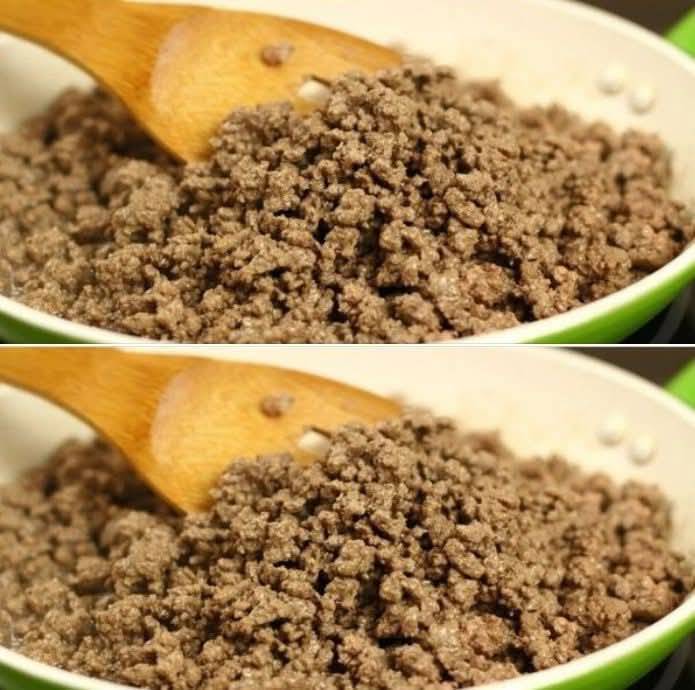ADVERTISEMENT
## **The Case Against Rinsing Ground Beef**
On the flip side, many chefs and food experts argue against rinsing ground beef. They believe that rinsing removes essential flavors, juices, and nutrients from the meat, leading to a less flavorful and less satisfying final dish. Here are some reasons why rinsing ground beef may not be the best approach.
### **1. Loss of Flavor**
One of the main reasons chefs and home cooks avoid rinsing ground beef is the loss of flavor. Ground beef is naturally flavorful because it contains fats that contribute to its richness. These fats help enhance the savory, umami qualities of beef, and rinsing can dilute or remove much of this flavor.
When you rinse cooked ground beef, you wash away some of the fat and juices that have been rendered during cooking. These juices are packed with flavor and can be incorporated into the dish. Removing these juices can lead to a less flavorful dish overall.
### **2. Loss of Nutrients**
While ground beef does contain fat, it also contains essential nutrients like protein, iron, and B vitamins. Some of these nutrients are found in the fat, and rinsing can lead to the loss of these valuable nutrients. While the fat content may be reduced by rinsing, you may also be sacrificing some of the nutritional value of the meat.
### **3. Waste of Water and Time**
Rinsing ground beef can be an extra, unnecessary step in the cooking process. Not only does it take time, but it can also be wasteful, especially in terms of water usage. In a time when sustainability and water conservation are becoming increasingly important, rinsing meat unnecessarily may not align with environmentally-conscious cooking practices.
### **4. Overcooked Beef**
Some argue that rinsing ground beef can lead to overcooked meat. Since you typically need to reheat the beef after rinsing, the extra cooking time can cause the beef to dry out or become too tough. Overcooking beef can result in a loss of moisture and tenderness, which diminishes the quality of the dish.
### **5. Risk of Cross-Contamination**
Rinsing ground beef, especially in a sink, can also present potential food safety risks. The act of rinsing can spread bacteria around the kitchen, particularly if raw meat is handled improperly. For example, water droplets can splatter onto countertops or utensils, increasing the risk of cross-contamination with other food items. The Centers for Disease Control and Prevention (CDC) strongly advises against rinsing raw meat for this reason.
—
## **Best Practices for Cooking Ground Beef**
While the decision of whether or not to rinse ground beef is ultimately a matter of personal preference, there are certain cooking practices you can follow to achieve the best results regardless of your approach.
### **1. Brown the Beef Properly**
Whether you choose to rinse the beef or not, the key to flavorful and tender ground beef is proper browning. When cooking ground beef, be sure to break it up into smaller pieces to ensure even cooking. Allow the beef to brown thoroughly, as this enhances the flavor through the Maillard reaction—a chemical reaction that occurs when meat is browned.
### **2. Drain Excess Fat (Without Rinsing)**
If you want to reduce the fat in your dish without rinsing, you can simply drain the excess grease from the beef after browning. Tilt the pan slightly to allow the fat to pool at the edge, then use a spoon to scoop out the grease. Alternatively, you can use paper towels to blot the excess fat.
### **3. Use Leaner Cuts of Beef**
If you’re concerned about fat but don’t want to sacrifice flavor, consider using leaner cuts of ground beef. Lean ground beef (90% or higher) will have less fat to begin with, meaning you don’t need to worry about rinsing it to remove excess grease. If you prefer a richer flavor, you can always use ground beef with a slightly higher fat content and drain the fat after cooking.
### **4. Simmer or Drain Sauces**
If you’re making a sauce with ground beef, such as in chili or spaghetti Bolognese, consider simmering the meat in the sauce for a few minutes. This allows the beef to absorb the flavors of the sauce and prevents the final dish from becoming too greasy. If you’re using a fatty ground beef, you can also spoon off any excess fat before adding the meat to the sauce.
—
## **Conclusion**
So, should you rinse ground beef? As with many cooking questions, the answer depends on your priorities. If your main concern is reducing the fat in your dish, rinsing ground beef can be an effective technique to achieve a leaner result. However, you may sacrifice flavor, texture, and nutritional content in the process. On the other hand, if you’re focused on maximizing flavor and preserving the integrity of the meat, it’s generally better to skip the rinse and instead focus on draining excess fat after cooking.
Ultimately, the decision comes down to personal preference, the dish you’re preparing, and the specific results you want to achieve. As you gain experience with cooking ground beef, you will learn how to strike the perfect balance between fat, flavor, and texture. Happy cooking!
